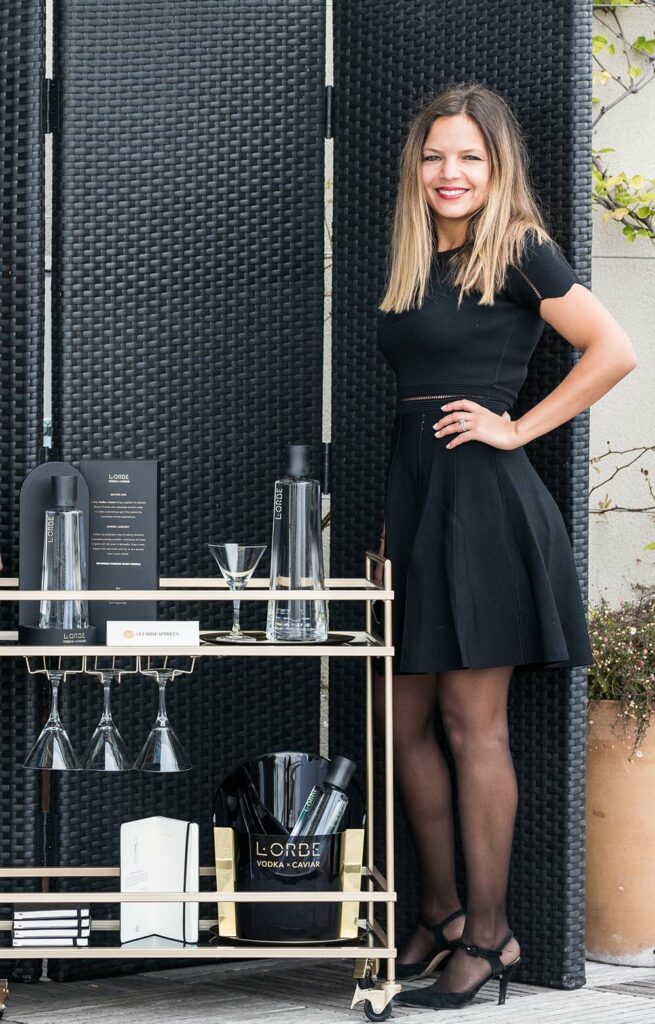If our article were a fairy tale, it would start with the sentence “Once upon a time, there was a princess named Shéhrazade, born in Morocco, who lived her childhood surrounded by scents and spices.” But Shéhrazade Schneider is a true entrepreneur and, although she is indeed originally from North Africa and was introduced to gastronomy at a very young age, her career is the result, not of a wave of a magic wand, but of thoughtful and decisive choices.
The heritage of cooking
Raised in a family of fine cooks, very early on she inherited a taste for accommodating food and a sense of welcome.
I was born in the Medina of Marrakech, where the cuisine is extremely generous. My grandmother and my mother passed on to me this sense of taste and hospitality, and that’s what gave me this propensity to take risks when it comes to blending flavours. My father, who is from the Champagne region, likes to prepare dishes that are rather typical of the East of France.
However, rather than going to a hotel school, she chose management training. “The most prestigious catering schools are a dream come true and I’m a lover of gastronomy, but I’m very happy with my training at ESCP. It has opened up a much wider range of possibilities and has enabled me to manage two companies that revolve around gastronomy.”
“The most difficult and challenging moments? Taking risks!”
After graduating from school, Shéhrazade Schneider first turned to investment banking, but quickly, with a friend who also graduated from ESCP, they created an atypical restaurant in Paris, Simone Lemon offering a colourful cuisine with world accents based on “out of the ordinary” fruits and vegetables, foods that are not usually served because they do not meet the usual aesthetic criteria of restaurant owners.
I made an important choice at the time. I didn’t ask a large company to train me, I trusted myself, and that was my biggest gamble.
It was a fantastic experience for her, both in the kitchen and in management. Five years during which she was able to approach all segments of the sector, from farm to fork.
Then another adventure presented itself. She took over the management of L’Orbe, a subsidiary of Pernod Ricard, within the group’s innovation hub and idea incubator. Her job: to create unique tasting experiences by combining exceptional ingredients with spirits. Her responsibilities range from managing R&D and production processes, defining and implementing the marketing & communication strategy, to ensuring sales in a more commercial role.

Within L’Orbe, which includes about ten people, Shéhrazade has a great deal of autonomy. “I run a tiny brand company that has its own annual budget. I have carte blanche but I also have to report to the president of Pernod Ricard once a year.”
Shéhrazade greatly appreciates her role as an intrapreneur, “I don’t waste time looking for or convincing investors, neither in the support or administrative functions, which are provided by the Pernod Ricard group. Intrapreneurship is the perfect balance between employment and entrepreneurship,“ she says. Nevertheless, she affirms that she would not have been able to succeed in this venture without prior entrepreneurial experience.
At the same time, Shéhrazade Schneider accompanies four restaurant owners in setting up their establishments, creating and optimising their management process.
Two important elements: innovation and sustainable development
Innovation is part of Shehrazade Schneider’s DNA.
“Above all and on a personal level, I love to cook, but I admit that I rarely follow recipes. In restaurants, I often ask the chef about a particular taste I have detected in a dish. As part of my job at L’Orbe, I am constantly on the lookout for new ingredients, new flavours and new sensations. When I find an exceptional ingredient, such as the white truffle from the home village of Alessandro Palazzi, legendary mixologist at Duke’s bar in London, I entrust it to the experts in our research laboratory, to test it by infusing it in a spirit with my team.”
“I am constantly trying to educate my palate and nose.” Although this research is not only focused on luxury products, its flagship product is a caviar-infused vodka, the result of five years of work in research and development. In charge of the branding, marketing and communication strategy, Shéhrazade has chosen from the outset to position the product on quality, which has led it to receive numerous awards. “It was a real strategic choice, which cost me some clients at the beginning, but which allowed me to create a brand that is now well-known.”
This success on the market has not been achieved at the expense of CSR (corporate social responsibility), which is dear to Shéhrazade, who is concerned about promoting quality ingredients that are not much coveted by restaurant owners because of their appearance.

Within L’Orbe, it is Pernod Ricard’s innovative and ground-breaking culture that is upheld, with Shéhrazade fully embracing it as well as the group’s values. All the packaging is renewable, the bottles are recyclable, the carbon impact of deliveries is monitored every year, and a real reflection is carried out on this issue.
Generally speaking, the young intrapreneur places people at the heart of her professional life:
“A company is above all men and women. You may have the best idea in the world, but if you don’t know how to inspire and motivate your team, you won’t be able to go very far. The magic happens when everyone blossoms personally by contributing to the creation of value.”
License and Republishing
The Choice - Republishing rules
We publish under a Creative Commons license with the following characteristics Attribution/Sharealike.
- You may not make any changes to the articles published on our site, except for dates, locations (according to the news, if necessary), and your editorial policy. The content must be reproduced and represented by the licensee as published by The Choice, without any cuts, additions, insertions, reductions, alterations or any other modifications.If changes are planned in the text, they must be made in agreement with the author before publication.
- Please make sure to cite the authors of the articles, ideally at the beginning of your republication.
- It is mandatory to cite The Choice and include a link to its homepage or the URL of thearticle. Insertion of The Choice’s logo is highly recommended.
- The sale of our articles in a separate way, in their entirety or in extracts, is not allowed , but you can publish them on pages including advertisements.
- Please request permission before republishing any of the images or pictures contained in our articles. Some of them are not available for republishing without authorization and payment. Please check the terms available in the image caption. However, it is possible to remove images or pictures used by The Choice or replace them with your own.
- Systematic and/or complete republication of the articles and content available on The Choice is prohibited.
- Republishing The Choice articles on a site whose access is entirely available by payment or by subscription is prohibited.
- For websites where access to digital content is restricted by a paywall, republication of The Choice articles, in their entirety, must be on the open access portion of those sites.
- The Choice reserves the right to enter into separate written agreements for the republication of its articles, under the non-exclusive Creative Commons licenses and with the permission of the authors. Please contact The Choice if you are interested at contact@the-choice.org.
Individual cases
Extracts: It is recommended that after republishing the first few lines or a paragraph of an article, you indicate "The entire article is available on ESCP’s media, The Choice" with a link to the article.
Citations: Citations of articles written by authors from The Choice should include a link to the URL of the authors’ article.
Translations: Translations may be considered modifications under The Choice's Creative Commons license, therefore these are not permitted without the approval of the article's author.
Modifications: Modifications are not permitted under the Creative Commons license of The Choice. However, authors may be contacted for authorization, prior to any publication, where a modification is planned. Without express consent, The Choice is not bound by any changes made to its content when republished.
Authorized connections / copyright assignment forms: Their use is not necessary as long as the republishing rules of this article are respected.
Print: The Choice articles can be republished according to the rules mentioned above, without the need to include the view counter and links in a printed version.
If you choose this option, please send an image of the republished article to The Choice team so that the author can review it.
Podcasts and videos: Videos and podcasts whose copyrights belong to The Choice are also under a Creative Commons license. Therefore, the same republishing rules apply to them.





